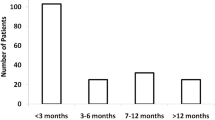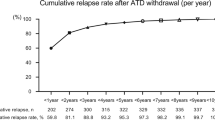Abstract
Purpose
In Graves’ disease, administration of low-dose methimazole for more than 60 months induces higher remission rates compared with the conventional duration of 12–18 months. However, the risk of recurrence and its predictors beyond 48 months of drug withdrawal are not known. The aims of this study were to determine the risk of recurrence during 84 months after withdrawal of short- or long-term methimazole therapy and a risk stratification for recurrence of hyperthyroidism.
Methods
A total of 258 patients were treated with methimazole for a median of 18 months and randomized to discontinuation of the drug(conventional short-term group; n = 128) or continuation of the treatment up to 60–120 months(long-term group; n = 130). Patients were followed for 84 months after methimazole withdrawal. Cox proportional hazards modeling was performed to identify factors associated with relapse and develop a risk-scoring model at the time of discontinuing the treatment.
Results
Hyperthyroidism recurred in 67 of 120(56%) of conventionally-treated patients versus 20 of 118(17%) of those who received long-term methimazole treatment, p < 0.001. Age, sex, goiter grade, triiodothyronine, thyrotropin, and thyrotropin receptor antibodies were significant predictors of recurrence in both “conventional” and “long-term” groups but free thyroxine just in the “long-term” group. The risk-scoring model had a good discrimination power (optimism corrected c-index = 0.78,95%CI = 0.73–0.82) with a range of 0–14 and sensitivity of 86% and specificity of 62% at the risk-score of eight.
Conclusion
A relapse-free state was achieved in 83% of patients with Graves’ hyperthyroidism 84 months after cessation of long-term methimazole treatment which could be predicted by some significant predictors in a simple risk-scoring system.





Similar content being viewed by others
References
J.P. Brito, S. Payne, N. Singh Ospina, R. Rodriguez-Gutierrez, S. Maraka, L.R. Sangaralingham, N.M. Iñiguez-Ariza, V.M. Montori, M.N. Stan, Patterns of use, efficacy, and safety of treatment options for patients with Graves’ disease: a nationwide population-based study. Thyroid 30(3), 357–364 (2020)
C.M. van Kinschot, V.R. Soekhai, E.W. de Bekker-Grob, W.E. Visser, R.P. Peeters, T.M. van Ginhoven, C. van Noord, Preferences of patients and clinicians for treatment of Graves’ disease: a discrete choice experiment. Eur. J. Endocrinol. 184(6), 803–812 (2021)
F. Azizi, R. Malboosbaf, Long-term antithyroid drug treatment: a systematic review and meta-analysis. Thyroid 27(10), 1223–1231 (2017)
F. Azizi, V. Yousefi, A. Bahrainian, F. Sheikholeslami, M. Tohidi, Y. Mehrabi, Long-term continuous methimazole or radioiodine treatment for hyperthyroidism. Arch. Iran. Med. 15(8), 0–0 (2012)
O.M. El Kawkgi, D.S. Ross, M.N. Stan, Comparison of long‐term antithyroid drugs versus radioactive iodine or surgery for Graves’ disease: a review of the literature. Clin. Endocrinol. 95(1), 3–12 (2021)
D. Villagelin, J.H. Romaldini, R.B. Santos, A.B. Milkos, L.S. Ward, Outcomes in relapsed Graves’ disease patients following radioiodine or prolonged low dose of methimazole treatment. Thyroid 25(12), 1282–1290 (2015)
F. Azizi, A. Amouzegar, M. Tohidi, M. Hedayati, D. Khalili, L. Cheraghi, Y. Mehrabi, M. Takyar, Increased remission rates after long-term methimazole therapy in patients with Graves’ disease: results of a randomized clinical trial. Thyroid 29(9), 1192–1200 (2019)
G.J. Kahaly, L. Bartalena, L. Hegedüs, L. Leenhardt, K. Poppe, S.H. Pearce, 2018 European Thyroid Association guideline for the management of Graves’ hyperthyroidism. Eur. Thyroid J. 7(4), 167–186 (2018)
D.S. Ross, H.B. Burch, D.S. Cooper, M.C. Greenlee, P. Laurberg, A.L. Maia, S.A. Rivkees, M. Samuels, J.A. Sosa, M.N. Stan, 2016 American Thyroid Association guidelines for diagnosis and management of hyperthyroidism and other causes of thyrotoxicosis. Thyroid 26(10), 1343–1421 (2016)
F. Azizi, H. Abdi, A. Amouzegar, Control of Graves’ hyperthyroidism with very long-term methimazole treatment: a clinical trial. BMC Endocr. Disord. 21(1), 1–7 (2021)
T. Konishi, Y. Okamoto, M. Ueda, Y. Fukuda, I. Harusato, Y. Tsukamoto, N. Hamada, Drug discontinuation after treatment with minimum maintenance dose of an antithyroid drug in Graves’ disease: a retrospective study on effects of treatment duration with minimum maintenance dose on lasting remission. Endocr. J. 58(2), 95–100 (2011)
D. Maugendre, A. Gatel, L. Campion, C. Massart, I. Guilhem, Y. Lorcy, J. Lescouarch, J. Herry, H. Allannic, Antithyroid drugs and Graves’ disease—prospective randomized assessment of long‐term treatment. Clin. Endocrinol. 50(1), 127–132 (1999)
E. Mazza, M. Carlini, D. Flecchia, A. Blatto, O. Zuccarini, S. Gamba, S. Beninati, M. Messina, Long-term follow-up of patients with hyperthyroidism due to Graves’ disease treated with methimazole. Comparison of usual treatment schedule with drug discontinuation vs continuous treatment with low methimazole doses: a retrospective study. J. Endocrinol Investig. 31(10), 866–872 (2008)
K. Shizume, M. Irie, S. Nagataki, F. Matsuzaki, Y. Shishiba, H. Suematsu, T. Tsushima, Long-term result of antithyroid drug therapy for Grave’s disease follow up after more than 5 years. Endocrinol Japonica 17(5), 327–332 (1970)
K. Okamura, S. Bandai, M. Fujikawa, K. Sato, H. Ikenoue, T. Kitazono, Long-term antithyroid drug treatment: Trends in serum TSH and TSH receptor antibody changes in patients with Graves' disease. Int. J. Endocrinol. Metab. 18(Suppl), e101139:1–8 (2020)
C. Perez, N.S. Scrimshaw, J. Munoz, Technique of endemic goitre surveys. Monogr. Ser. World Health Organ 44, 369–383 (1960)
D. Hermsen, M. Broecker-Preuss, M. Casati, J.C. Mas, A. Eckstein, D. Gassner, J. van Helden, K. Inomata, J. Jarausch, J. Kratzsch, Technical evaluation of the first fully automated assay for the detection of TSH receptor autoantibodies. Clin. Chim. Acta 401(1-2), 84–89 (2009)
A. Amouzegar, H. Delshad, L. Mehran, M. Tohidi, F. Khafaji, F. Azizi, Reference limit of thyrotropin (TSH) and free thyroxine (FT4) in thyroperoxidase positive and negative subjects: a population based study. J. Endocrinol Investig. 36(11), 950–954 (2013)
E. Piantanida, A. Lai, L. Sassi, D. Gallo, E. Spreafico, M. Tanda, L. Bartalena, Outcome prediction of treatment of Graves’ hyperthyroidism with antithyroid drugs. Horm. Metab. Res. 47(10), 767–772 (2015)
D.G. Kleinbaum, Epidemiologic methods: the “art” in the state of the art. J. Clin. Epidemiol. 55(12), 1196–1200 (2002)
Steyerberg E.W.: Overfitting and optimism in prediction models. In: Clinical prediction models. Springer; 2019: 95-112.
K.P. Burnham, D.R. Anderson, Multimodel inference: understanding AIC and BIC in model selection. Sociol Methods Res. 33(2), 261–304 (2004)
U. Feldt-Rasmussen, H. Schleusener, P. Carayon, Meta-analysis evaluation of the impact of thyrotropin receptor antibodies on long term remission after medical therapy of Graves’ disease. J. Clin. Endocrinol. Metab. 78(1), 98–102 (1994)
O. Törring, L. Tallstedt, G. Wallin, G. Lundell, J.-G. Ljunggren, A. Taube, M. Sääf, B. Hamberger, Graves’ hyperthyroidism: treatment with antithyroid drugs, surgery, or radioiodine–a prospective, randomized study. Thyroid Study Group. J. Clin. Endocrinol. Metab. 81(8), 2986–2993 (1996)
P.-W. Wang, Prediction of relapse after antithyroid drugs withdrawal: A narrative review. Int. J. Endocrinol. Metab. 18(Suppl), e102346:1–8 (2020)
A.K. Eckstein, H. Lax, C. Lösch, D. Glowacka, M. Plicht, K. Mann, J. Esser, N.G. Morgenthaler, Patients with severe Graves’ ophthalmopathy have a higher risk of relapsing hyperthyroidism and are unlikely to remain in remission. Clin. Endocrinol. 67(4), 607–612 (2007)
N.N.Z. Tun, G. Beckett, N.N. Zammitt, M.W. Strachan, J.R. Seckl, F.W. Gibb, Thyrotropin receptor antibody levels at diagnosis and after thionamide course predict Graves’ disease relapse. Thyroid 26(8), 1004–1009 (2016)
B. Quadbeck, R. Hoermann, U. Roggenbuck, S. Hahn, K. Mann, O.E. Janssen, Sensitive thyrotropin and thyrotropin-receptor antibody determinations one month after discontinuation of antithyroid drug treatment as predictors of relapse in Graves’ disease. Thyroid 15(9), 1047–1054 (2005)
C. Carella, G. Mazziotti, F. Sorvillo, M. Piscopo, M. Cioffi, P. Pilla, R. Nersita, S. Iorio, G. Amato, L. Braverman, Serum thyrotropin receptor antibodies concentrations in patients with Graves’ disease before, at the end of methimazole treatment, and after drug withdrawal: evidence that the activity of thyrotropin receptor antibody and/or thyroid response modify during the observation period. Thyroid 16(3), 295–302 (2006)
F. Azizi, Long-term treatment of hyperthyroidism with antithyroid drugs: 35 years of personal clinical experience. Thyroid 30(10), 1451–1457 (2020)
F. Azizi, H. Abdi, L. Mehran, A. Amouzegar, Appropriate duration of antithyroid drug treatment as a predictor for relapse of Graves' disease: a systematic scoping review. J. Endocrinol. Investig. 45(6), 1139–1150 (2022)
D.S. Cooper, Long-term antithyroid drug therapy. Curr. Opin. Endocrinol., Diabetes Obes. 28(5), 510–516 (2021)
R. Malboosbaf, F. Azizi, Long-term treatment with antithyroid drugs: Efficacy and safety. Int. J. Endocrinol. Metab. 18(Suppl), e101487:1–10 (2020)
T. Struja, H. Fehlberg, A. Kutz, L. Guebelin, C. Degen, B. Mueller, P. Schuetz, Can we predict relapse in Graves’ disease? Results from a systematic review and meta-analysis. Eur. J. Endocrinol. 176(1), 87–97 (2017)
X.G. Vos, E. Endert, A. Zwinderman, J.G. Tijssen, W.M. Wiersinga, Predicting the risk of recurrence before the start of antithyroid drug therapy in patients with Graves’ hyperthyroidism. J. Clin. Endocrinol. Metab. 101(4), 1381–1389 (2016)
M. Preus, M. Frecker, V. Stenszky, C. BALAŠS, N. Farid, A prognostic score for Graves’ disease. Clin. Endocrinol. 23(6), 653–661 (1985)
A. Allahabadia, J. Daykin, R.L. Holder, M.C. Sheppard, S.C. Gough, J.A. Franklyn, Age and gender predict the outcome of treatment for Graves’ hyperthyroidism. J. Clin. Endocrinol. Metab. 85(3), 1038–1042 (2000)
P. Anagnostis, F. Adamidou, S.A. Polyzos, S. Katergari, E. Karathanasi, C. Zouli, A. Panagiotou, M. Kita, Predictors of long-term remission in patients with Graves’ disease: a single center experience. Endocrine 44(2), 448–453 (2013)
E. Masiello, G. Veronesi, D. Gallo, P. Premoli, E. Bianconi, S. Rosetti, C. Cusini, J. Sabatino, S. Ippolito, E. Piantanida, Antithyroid drug treatment for Graves’ disease: baseline predictive models of relapse after treatment for a patient-tailored management. J. Endocrinol Investig. 41(12), 1425–1432 (2018)
T. Struja, M. Kaeslin, F. Boesiger, R. Jutzi, N. Imahorn, A. Kutz, L. Bernasconi, E. Mundwiler, B. Mueller, M. Christ-Crain et al. External validation of the GREAT score to predict relapse risk in Graves’ disease: results from a multicenter, retrospective study with 741 patients. Eur. J. Endocrinol. 176(4), 413–419 (2017)
S.S. Zuhur, G. Elbuken, I. Yildiz, P. Kadioglu, S. Erol, S. Sahin, F. Kilinc, G. Akbaba, B. Topcu, Y. Altuntas, External Validation of the GREAT Score in Turkish Patients with Graves’ Hyperthyroidism Treated with the Titration Regimen Method of Antithyroid Drugs: A Multicenter Study. Horm. Metab. Res. = Horm.- und Stoffwechselforschung = Hormones et. Metab. 51(10), 627–633 (2019)
Acknowledgements
We wish to acknowledge Ms. Tahereh Fakhimi for her secretary role during manuscript preparation.
Author contributions
F.A. contributed to the study conception and design. Material preparation, data collection and analysis were performed by F.A., A.A., D.K., H.A., M.T., M.H., L.C., Y.M. The first draft of the manuscript was written by F.A. and all authors commented on previous versions of the manuscript. All authors read and approved the final manuscript.
Funding
This study was supported in part by Grant No. 22198-1 from Shahid Beheshti University of Medical Sciences.
Author information
Authors and Affiliations
Corresponding author
Ethics declarations
Conflict of interest
The authors declare no competing interests.
Ethics Approval
The ethics committee of the Research Institute for Endocrine Sciences approved the protocol and all patients provided informed consent.
Additional information
Publisher’s note Springer Nature remains neutral with regard to jurisdictional claims in published maps and institutional affiliations.
Rights and permissions
Springer Nature or its licensor (e.g. a society or other partner) holds exclusive rights to this article under a publishing agreement with the author(s) or other rightsholder(s); author self-archiving of the accepted manuscript version of this article is solely governed by the terms of such publishing agreement and applicable law.
About this article
Cite this article
Azizi, F., Amouzegar, A., Khalili, D. et al. Risk of recurrence at the time of withdrawal of short- or long-term methimazole therapy in patients with Graves’ hyperthyroidism: a randomized trial and a risk-scoring model. Endocrine (2024). https://doi.org/10.1007/s12020-023-03656-5
Received:
Accepted:
Published:
DOI: https://doi.org/10.1007/s12020-023-03656-5




